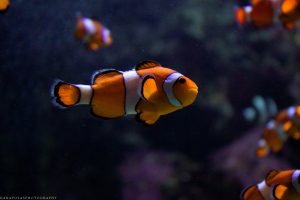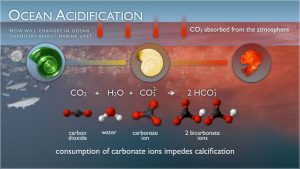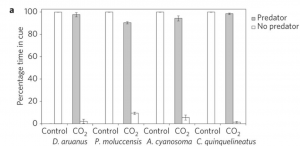Ocean Acidification is Making Nemo Lose His Mind!
By Ana Pozas posted on February 11th, 2019
Ocean acidification – sometimes referred to as the evil twin of climate change – is even scarier when you find out what it is doing to reef fish behaviour…

Photo taken by Ana Pozas. Vancouver Aquarium 2017
Ocean Acidification
The facts are that 30% of the CO2 in the atmosphere is absorbed by our oceans, and they are not dealing with it too well. Ocean pH has decreased from 8.2 to 8.1 during the past century, making our oceans more acidic (NOAA, 2013).
The chemistry is like this: CO2 dissolves into the ocean and reacts with H2O to become carbonic acid (H2CO3). More CO2 in the atmosphere means more carbonic acid, which reacts with calcium carbonate (CaCO3). This depletes the available CaCO3 for shelled organisms to grow and calcify their protective shells (ACS, 2019).

The effects of ocean acidification on marine life. Source: NOAA
Although this is one of the main consequences of ocean acidification, it is definitely not the only one.
Ocean acidification is making reef fish ‘braver’ towards predators, and consequently increasing their chances of being eaten!
In acidified conditions, bicarbonate ion increase disrupts GABAA receptors in the fish’ brain causing behavioural changes and disrupted cognitive function (Munday et al., 2014).
Munday et al. (2014) tested the behaviour of juvenile reef fish in natural CO2 seeps in Papua New Guinea and found that the fish were ‘bolder’ compared to control reefs and preferred predator smells!

Juvenile fish from either the control or CO2 reef were given the choice of: offshore water with or without predator odour (a), water from the CO2 seep site or the control reef (Munday et al., 2014)
A study by Dixon (2011) found that larvae reef fish are especially vulnerable to these changes. Fish larvae were raised in laboratory conditions simulating projected ocean acidification in the next 50-100 years. These fish were unable to discriminate between several chemical cues including predator scents, causing higher mortality rates compared to larvae reared in non-acidified water conditions.
Why is this important?
These behavioural changes to larvae fish may cause dramatic population declines of their species, altering the interconnectedness of marine ecosystems and risking their ability to someday replenish (Dixson, 2011).
More generally, we heavily depend on our oceans for food and services, but with overfishing and climate change, we are slowly depleting the non bottomless ocean and even changing the behaviour of species while exploitative activities still persist. Oceans have limited richness and are of delicate health. The pace of these physical and behavioural changes to marine species is faster than our understanding of it.
It’s not all gloom and doom…
It is just as important to talk about positive ocean stories and progress to inspire interest and hope in people. And of course, to fuel the motivation for us ocean lovers and defenders.
Want to help? Stay up to date about our oceans’ health and voice your opinions to push for change. Check out #OceanConsvnUBC #OceanOptimism and follow me @AnaLuciaPozas for more exciting ocean talk!
References:
Australian Institute of Marine Science. (2014, April 13). Ocean acidification robs reef fish of their fear of predators. ScienceDaily. Retrieved February 9, 2019 from www.sciencedaily.com/releases/2014/04/140413135907.htm
Danielle L. Dixson. (2015). University of Delaware [Brochure]. Author. Retrieved February 11, 2019, from https://www.ceoe.udel.edu/File Library/Our People/Profiles/dixson/DixonIssue1-OA-LR.pdf
Danielle L. Dixson. Ocean Acidification Effects Fish Behavior and Survival as a Consequence of Impaired Chemoreception. Conference: American Fisheries Society 140th Annual Meeting, 2011.
Ocean Acidification. (n.d.). Retrieved from https://www.awi.de/en/focus/ocean-acidification/presse/enormous-progress-in-ocean-acidification-research-new-report-summarises-current-state-of-knowledge.html
Ocean acidification. (n.d.). Retrieved from https://www.noaa.gov/education/resource-collections/ocean-coasts-education-resources/ocean-acidification
Ocean Chemistry. (n.d.). Retrieved from https://www.acs.org/content/acs/en/climatescience/oceansicerocks/oceanchemistry.html
Philip L. Munday, Alistair J. Cheal, Danielle L. Dixson, Jodie L. Rummer, Katharina E. Fabricius. Behavioural impairment in reef fishes caused by ocean acidification at CO2 seeps. Nature Climate Change, 2014; DOI: 10.1038/NCLIMATE2195
